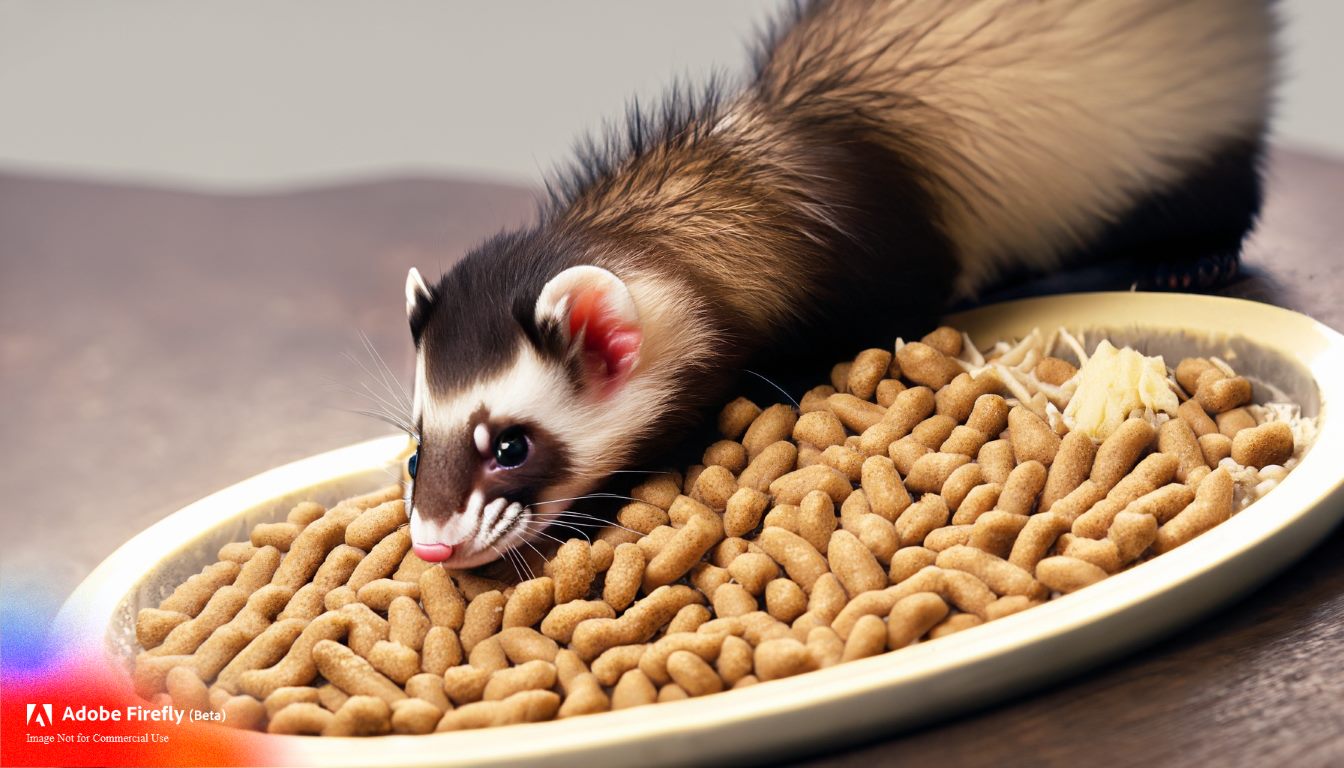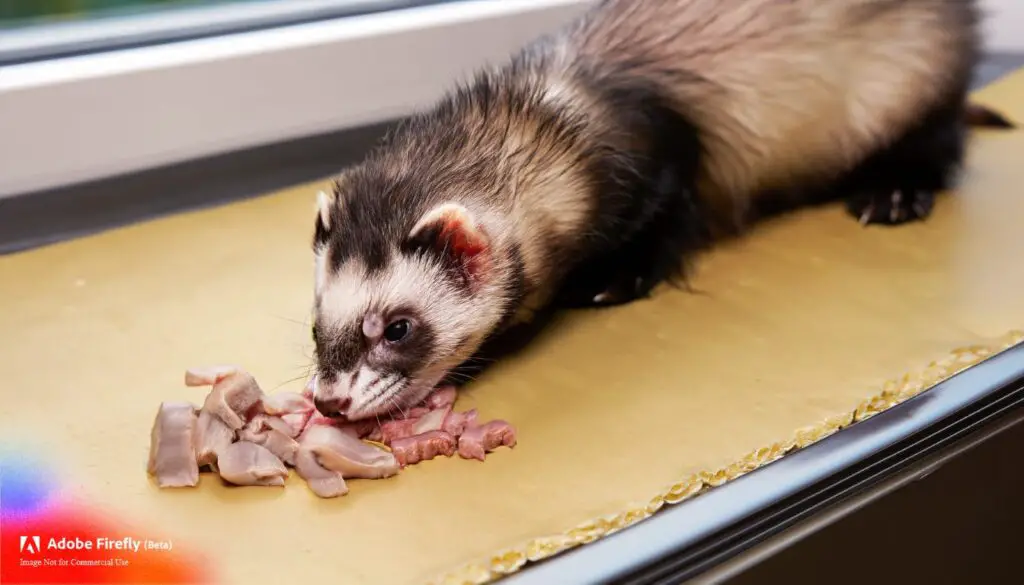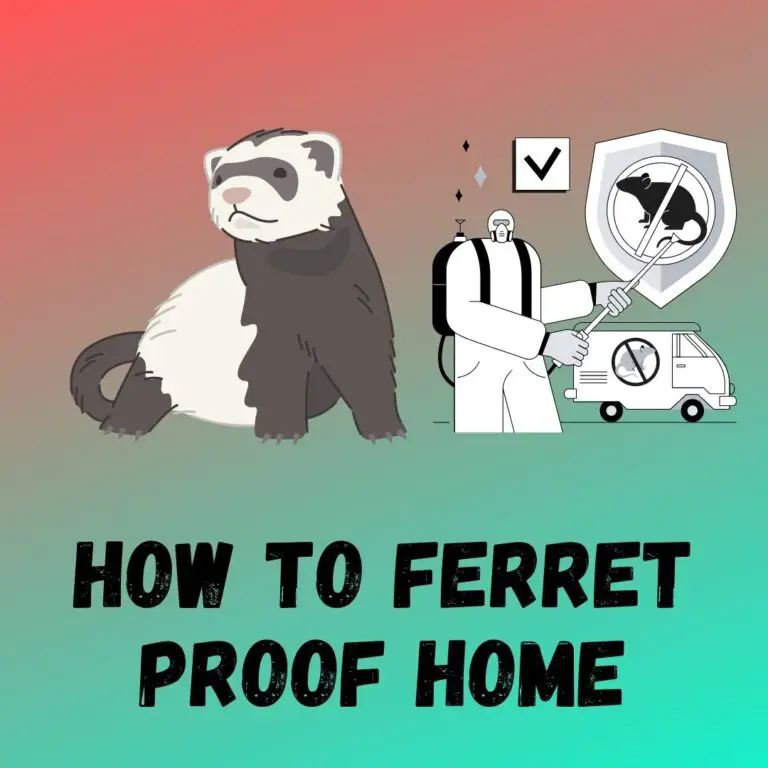
There are many options for feeding your ferret. While many owners go the pre-packaged route, others prefer to provide a whole prey diet. A whole prey diet is just what the name implies — feeding your ferret whole animals, such as chicks, rats or mice. Or, they opt for a raw food diet, using cut-up raw meat.
There are many reasons to choose these options:
- Ferrets are obligate carnivores, meaning they are meant to eat only meat. Their digestive systems are not meant to handle grains, vegetables, fruit or other foods.
- Whole prey provides natural dental care when the ferret gnaws the bones.
- Many owners report that their whole-prey-fed ferrets have healthier fur, more energy and fewer odors than those who eat processed ferret food.
- A whole-prey diet can save owners time and money because veterinarian bills will be lower: Ferrets won’t need their teeth cleaned as often and they will be in overall better health. In addition, ferret owners won’t need to buy as much litter, deodorants or tooth-care supplies.

So, how exactly does one put a ferret on a whole-prey diet?
You may be able to trap mice, rats or other prey around your own home or even raise those animals specifically for feeding your ferret. One advantage to this is you know where it came from and that the meat is fresh.
However, you would probably need to kill the prey yourself first before feeding it to your ferret. (It is not recommended to feed live prey to your ferret.) If you rely on wild mice, rats or chicks from around your home, you need to be careful because the prey may have ingested chemicals that could be harmful to your ferret. Also, once any such live prey around your home was eaten by the ferret, you would have to obtain more.
Newcomers to ferret life may be a bit unnerved to learn that frozen whole prey is often readily available at pet stores or online. The cost varies depending on the type of prey and the vendor. Purchasing from a brick-and-mortar business may be less expensive because there is no shipping involved. One online forum for ferret owners estimated a whole-prey diet would cost about $50 per month.
whole prey or pre-packaged ferret food
Another alternative to whole prey or pre-packaged ferret food is to make your own ferret food from raw meat. Many owners prefer to do this because they can purchase the meat when they make their own grocery store purchases.
For instance, they could feed their ferret the wings, necks or gizzards of chickens, turkeys or Cornish game hens (i.e., poultry pieces left over from a family dinner). They could also use pieces of pork or even scrambled egg.
The same online forum at Ferret.com estimated a raw-food diet for your ferret would cost about $30 per month.
A raw diet could be a good alternative, But risky.
Raw meat could contain salmonella, E. coli or other dangerous bacteria. Likewise, if your ferret has a tendency to hide food, that food could become dangerous for your fuzzy as well as for the rest of your household if it was left untouched for a long period of time.
In addition, while raw food is convenient for you to buy, it can take a lot of time to make sure it is properly cut up, stored and discarded appropriately.
Of course, it is possible to combine a whole-prey and a raw food diet, thereby combining the benefits of both. The forum at Ferret.com estimated the cost of such a combined diet to be between $35 and $40 per month.
“Wait a minute! My pre-processed ferret food only costs me about $20 per month. Plus it’s less trouble – and quite frankly, less, er, disgusting. Maybe I should just stick with that.”
ferret owners consider Less Expensive pre-processed foods
While it’s true that many ferret owners consider pre-processed food less expensive and easier to manage, it’s important to remember that all ferret food is not the same. The cheaper brands may have fillers, like grains and sugars that are not good for your ferret. In fact they could cause digestive problems that will not only harm your ferret; they will also lead to more veterinary visits and thus cause you more money in the long run.
And don’t think you can cheat by using food designed for cats, dogs or other critters either. Each species has its own nutritional needs. Dog food was designed for dogs, cat food for cats, etc. A ferret needs food created for ferrets. (However, if you’re completely out of ferret food and the pet store is temporarily out of stock, you could use a very-high-quality cat food for a short time. But return to ferret food as soon as possible.)
Summary
There is no hard and fast rule as to whether pre-packaged, raw or whole prey foods are best for your ferret. Some owners use a combination of all of these. However, if your ferret has been eating solely a pre-packaged diet, it may be a challenge to introduce raw or whole prey foods at first. Many owners find that combining the raw or whole prey with the pre-packaged food acclimates their fuzzies to their new diet fairly easily.






